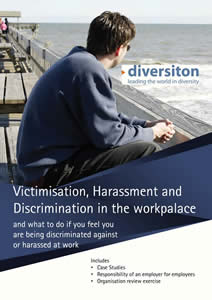Victimisation
Victimisation occurs when an individual is treated in a way that is detrimental because:
- They have made a complaint about being discriminated against or harassed.
- They intend to make a complaint about discrimination or harassment.
- They have or intend to act as a witness or give evidence in support of another person(s) relating to a complaint about discrimination or harassment.
Victimisation may present in many ways. It may be that individuals are refused requests for time off, denied promotion or training, ignored by their manager or colleagues, criticised continually for their work, ‘messed around’ with respect to their work allocation or shift arrangement/days off and so on.
If this happens and an organisation does not take reasonable steps to prevent it, the organisation will be liable to pay compensations. Individuals who victimise may also be ordered to pay compensation.
What to do if you feel that you are
experiencing discrimination or being harassed
5 Steps you can take
If you think you are being harassed or discriminated against you may wish to consider speaking to the person(s) who is doing this and explaining to them that their behaviour is unwelcome. It will probably be helpful to ask a friend, colleague or trade union representative to support you when you do this. You should make your feelings about what is happening very clear – but avoid being perceived as bullying the individual. Sometimes harassment can be unintentional and if the person concerned is willing to listen and take on board your concerns, you may be able to stop the unwelcome behaviour and move forward in a way that is satisfactory to you.
If speaking to the person does not stop the problem speak to their manager or your trade union representative. If the person is your supervisor or manager, go to a manager at a higher level or speak to your personnel or HR department. Management should then take responsibility for investigating your concerns and take appropriate action in a way that is sympathetic and helpful.
If your concerns have still not been addressed in a way that is satisfactory to you, and if you have not already done so, speak to your personnel/HR department or an equality advisor.
If the management you have spoken to have not been willing, or able, to help you, use your organisation’s grievance procedure. If you have not already done so, ask also for a copy of your company’s equality policy, if it has one. In presenting your concerns, you may find it useful to refer to this. At grievance meetings, you have a legal right to be accompanied by a trade union representative or work colleague. Depending upon the size of your organisation, your grievance procedure may have a number of stages, with appeals to higher levels of management. If you do not believe your concerns are being properly addressed, take your grievance to the highest level you can.
If you have tried all of these things or your employer does not have a grievance procedure, you may be able to bring a complaint to an employment tribunal under the Employment Equality (Religion or Belief) Regulations 2003. You do not have to leave your job to make such a complaint. You and any witnesses have a right not to be victimised for following up a grievance or taking a complaint to an employment tribunal under the regulations, provided the complaint was made in good faith. If you are dismissed because you objected to conduct towards you, you may be able to bring a complaint of unfair dismissal to an employment tribunal. Note that complaints to an employment tribunal must normally be brought within three months of the act you are complaining about. If your grievance procedure involves a number of steps, take care not to exceed the three month point. If necessary, you can make your complaint and continue to try and get a resolution of your concerns through the grievance meetings.






